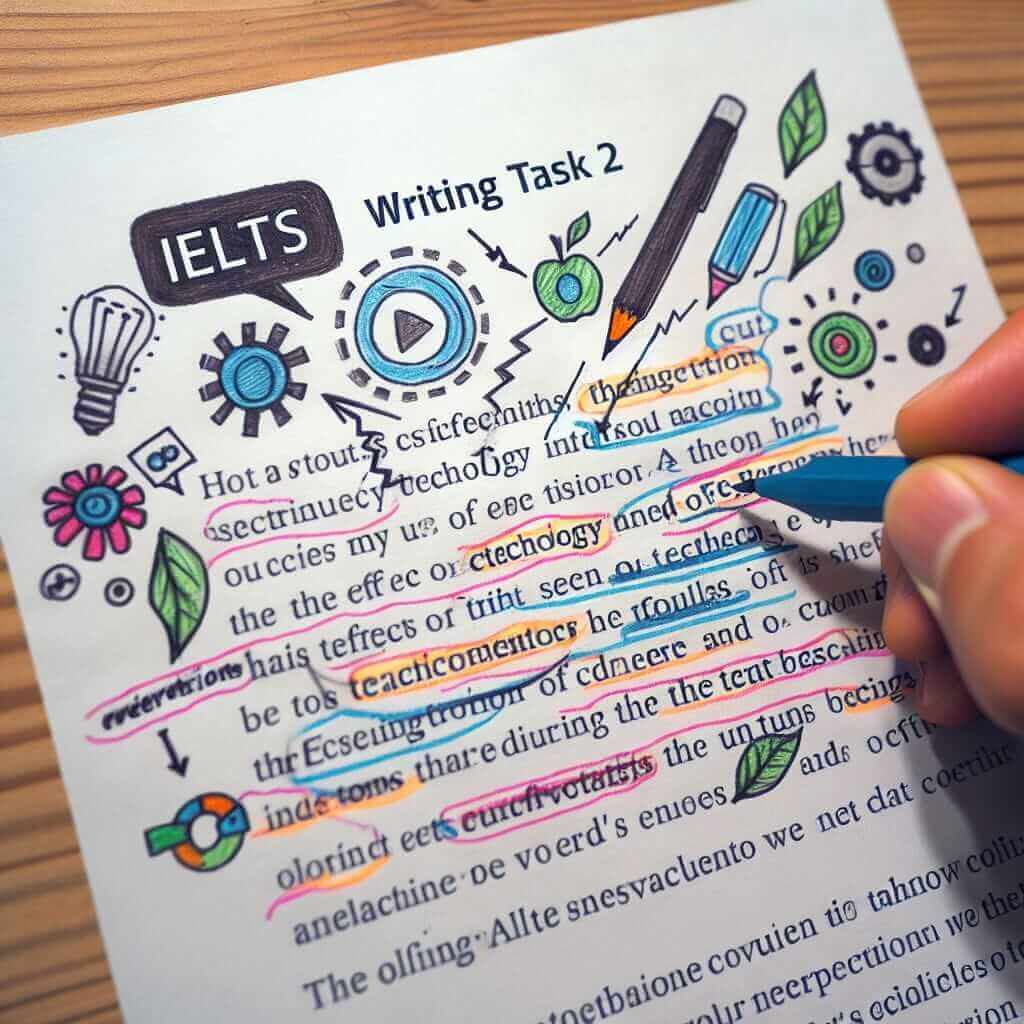The IELTS Writing test often strikes fear in the hearts of even the most confident English speakers. It’s not just about being fluent; it’s about demonstrating a strong grasp of grammar, vocabulary, and the ability to construct well-organized and coherent essays. Whether you’re aiming for a band 7 or a band 9, honing your writing skills is essential for IELTS success.
As an IELTS instructor with over 20 years of experience, I’ve seen firsthand the challenges students face and the strategies that lead to significant improvements. In this comprehensive guide, we’ll delve into proven techniques and insider tips to help you elevate your writing and achieve your desired IELTS score.
Understanding the IELTS Writing Test
Before diving into specific strategies, it’s crucial to understand what examiners are looking for. The IELTS Writing test assesses your ability to:
- Task Achievement: Respond fully to the task prompt, addressing all parts and presenting a clear position.
- Coherence and Cohesion: Organize your ideas logically, using linking words and phrases to create a smooth flow.
- Lexical Resource: Employ a wide range of vocabulary accurately and appropriately.
- Grammatical Range and Accuracy: Use a variety of sentence structures correctly.
Effective Strategies to Improve Your IELTS Writing
1. Master the Fundamentals of Grammar and Vocabulary
Grammar:
- Brush up on tenses: Ensure you understand the nuances of different tenses and can use them accurately. Common areas of difficulty include the present perfect, past perfect, and future tenses.
- Learn to use a variety of sentence structures: Don’t rely solely on simple sentences. Incorporate complex sentences using relative clauses, conditional clauses, and other structures to demonstrate grammatical range.
- Practice subject-verb agreement: This is a common error that can lower your score. Make sure your subject and verb agree in number (singular or plural).
Vocabulary:
- Expand your vocabulary: Don’t settle for basic words. Learn synonyms for common words and practice using them in context.
- Use collocations: Collocations are words that commonly go together (e.g., “strong opinion,” “make a decision”). Using collocations naturally enhances your writing.
- Avoid informal language and slang: Stick to formal or semi-formal language appropriate for an academic setting.
2. Plan Your Essays Strategically
Understand the prompt: Before you start writing, take time to thoroughly analyze the essay prompt. Identify the key words and make sure you understand what is being asked.
Brainstorm ideas: Jot down any relevant ideas or arguments that come to mind.
Create an outline: Organize your thoughts into a logical structure. A typical essay structure includes an introduction, body paragraphs (2-3), and a conclusion.
3. Craft Effective Introductions and Conclusions
Introductions:
- Start with a hook: Engage the reader from the first sentence. You can use a relevant quote, statistic, or a thought-provoking question.
- Provide background information: Briefly introduce the topic and any necessary context.
- State your thesis statement: Clearly state your main argument or position on the topic.
Conclusions:
- Restate your thesis: Summarize your main points in a clear and concise manner.
- Offer a final thought or call to action: Leave the reader with a memorable statement or a suggestion for further action.
4. Develop Coherent and Cohesive Paragraphs
Use topic sentences: Begin each body paragraph with a clear topic sentence that introduces the main idea of the paragraph.
Provide supporting evidence: Support your topic sentence with relevant examples, statistics, or personal anecdotes.
Use linking words and phrases: Use transition words and phrases (e.g., however, therefore, in addition) to connect ideas within and between paragraphs, creating a smooth flow.
5. Practice, Practice, Practice
The key to improving your writing is consistent practice.
- Write regularly: Set aside dedicated time each day or week to write essays on a variety of IELTS topics.
- Get feedback: Ask an experienced IELTS teacher or tutor to review your writing and provide constructive criticism.
- Analyze model essays: Study high-scoring IELTS essays to understand what makes them successful. Pay attention to the structure, vocabulary, and grammar used.
- Time yourself: As you get closer to the exam, practice writing essays within the time limit to simulate exam conditions.

Example: Analyzing an IELTS Writing Task 2 Prompt
Prompt:
Some people believe that it is more important to protect the environment than it is to address global economic problems. To what extent do you agree or disagree?
Analysis:
- Keywords: environment, global economic problems, protect, address
- Task: Present your opinion on whether environmental protection should be prioritized over global economic issues.
- Possible arguments:
- Agree: Environmental damage has long-term economic consequences; a healthy planet is essential for economic stability.
- Disagree: Addressing poverty and economic inequality is crucial for improving living standards; economic growth can fund environmental initiatives.
Tips for Success
- Don’t memorize templates: While it’s helpful to have a general essay structure in mind, avoid memorizing entire essays. Examiners are trained to spot this and will penalize you for it.
- Read widely: Reading articles, books, and essays on a variety of topics will expose you to different writing styles and vocabulary.
- Proofread carefully: Leave time at the end to review your work for any grammatical errors, spelling mistakes, or awkward phrasing.
Conclusion
Improving your writing skills for the IELTS takes time and effort, but it is an achievable goal. By mastering the fundamentals, planning strategically, and practicing regularly, you can approach the writing test with confidence. Remember to seek feedback and learn from your mistakes. With dedication and perseverance, you can achieve your desired IELTS band score.